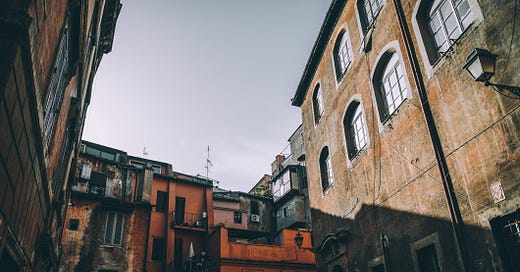Polkas, pasta and generational trauma
I’m constantly caught in a purgatory of what I want for myself and what my European ancestors have destined for me
In the midst of my recent meditations on identity, I’ve realize that the biggest influence on who I am is my being a second generation European-American. I normalized this for a lot of my life and assumed that everyone I knew carried the same conflicting experience I did.
Happy Monday and thank you, as always, for being here <3
When I was a kid, I was paralyzed at the thought of my grandfather moving back to Italy. Not understanding the complexities of citizenship and immigration, I thought it was as simple a process as my childhood best friend moving to Florida.
I overheard so many of his long-distance phone calls to the old country that I logically assumed he was homesick for his family and friends. He was constantly comparing every American thing to the Italian equivalent that I couldn’t understand how he could have been happy to live here.
The anxiety of not knowing when to expect this disruption to my life prompted me to ask him. He looked at me with loving confusion and assured me that he wouldn’t never leave Pittsburgh. He held my face with his big, calloused hands and said I was the love of his life.
It wasn’t until my young adulthood that I embraced the significance of my being a third generation European immigrant. While I heard many people describe their heritage as a “Heinz 57” variety, I knew exactly where I was from: my mom being a first generation Italian and my dad a first generation Czechoslovakian (or whatever that would be in our modern Czech Republic world).
I grew up with thick European accents around the house, homemade gnocchi on the stovetop and polkas playing over the radio. Remembering all of this explains why I sometimes feel “more Italian” than my peers who claim that their mother makes a world famous lasagna, and demystifies why my fair skin, curly hair and Slavic surname confuses most people I meet for the first time.
The novelty of my colorful identity levels out with the heavy doses of generational, immigrational trauma that my parents have unknowingly projected. Neither of them were equipped with the vocabulary to discuss mental health, for example, because I doubt either of my grandparents knew the word depression in English.
Drastically different from the individualist, American idea of family, the narrow, European familial tradition is suffocating. From a young age I was raised with the expectation of taking care of my parents when their health inevitably failed them, and was instilled the importance of living close to home in the event of an emergency.
I’ve cried buckets of warm, angry tears over being reminded that “family is the most important thing” whenever I seemed to be callous to my mother’s narcissistic feelings. I resentfully watched many of my friends excitedly move across the country with the loving support of their parents, while the guilty weight of living only 300 miles away sat heavily on my chest every night.
Europeans are judgmental people, comparing strangers they see in public to their idealistic, conservative expectations of the old country, and I learned quickly that these verbal criticisms do not exclude family. I was a very quiet kid at the dinner table out of fear that my thoughts, ideas or stories would be scrutinized.
This behavior persists now as an independent young woman, as I have to actively resist seeking affirmation or advice before coming to an independent decision. This is the boundary my family most often crosses, but through a lot of painful discourse, the very short list of conversation topics I allow has grown ever so slightly.
I would never claim to have it “easier” or “harder” than first generation immigrants—or immigrants themselves—by painting my white, upper middle class experience as some sort of melodrama. To avoid gaslighting myself and my experience, it’s important for me to recognize that each has their own respective sets of emotional challenges.
Solely from observing my parents, it seems that the separation of second gens to the immigration experience is so close that the strict observance of their heritage is voluntarily embraced. My parents never speak ill of their upbringing—even when prodded—and only share fond memories of their childhood. They have trouble understanding why I discuss my relationship with them so often in therapy.
Speaking for myself though, there is just enough uncomfortable distance to my heritage that I’m caught in a purgatory of what I want for myself and what my ancestors have destined for me. My ancestral pride is constantly in conflict with my stubborn insistence on individuality, and I have yet to find the balance of being myself while still being a part of something.
Feature Photo by Nathan McBride on Unsplash




